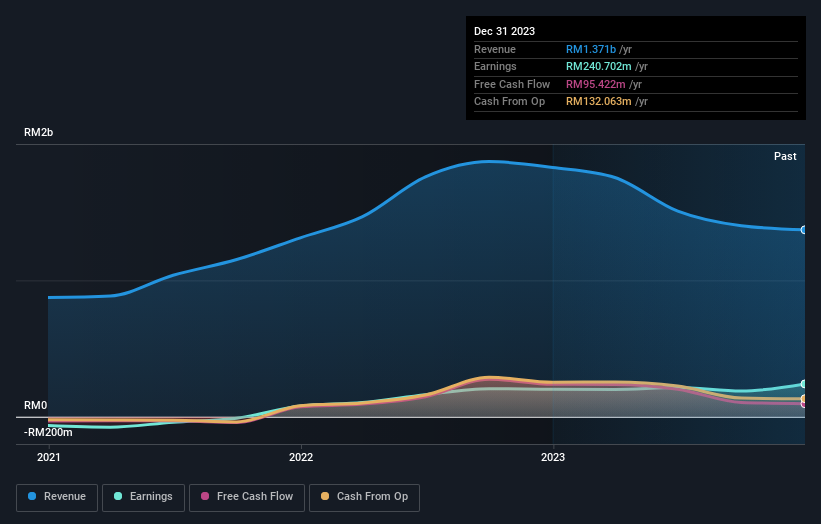Keck Seng (Malaysia) Berhad (KLSE:KSENG) insiders have significant skin in the game with 37% ownership
Key Insights
Insiders appear to have a vested interest in Keck Seng (Malaysia) Berhad's growth, as seen by their sizeable ownership
54% of the business is held by the top 5 shareholders
A look at the shareholders of Keck Seng (Malaysia) Berhad (KLSE:KSENG) can tell us which group is most powerful. With 37% stake, individual insiders possess the maximum shares in the company. That is, the group stands to benefit the most if the stock rises (or lose the most if there is a downturn).
With such a notable stake in the company, insiders would be highly incentivised to make value accretive decisions.
Let's take a closer look to see what the different types of shareholders can tell us about Keck Seng (Malaysia) Berhad.
View our latest analysis for Keck Seng (Malaysia) Berhad
What Does The Institutional Ownership Tell Us About Keck Seng (Malaysia) Berhad?
Institutions typically measure themselves against a benchmark when reporting to their own investors, so they often become more enthusiastic about a stock once it's included in a major index. We would expect most companies to have some institutions on the register, especially if they are growing.
As you can see, institutional investors have a fair amount of stake in Keck Seng (Malaysia) Berhad. This suggests some credibility amongst professional investors. But we can't rely on that fact alone since institutions make bad investments sometimes, just like everyone does. If multiple institutions change their view on a stock at the same time, you could see the share price drop fast. It's therefore worth looking at Keck Seng (Malaysia) Berhad's earnings history below. Of course, the future is what really matters.
We note that hedge funds don't have a meaningful investment in Keck Seng (Malaysia) Berhad. Because actions speak louder than words, we consider it a good sign when insiders own a significant stake in a company. In Keck Seng (Malaysia) Berhad's case, its Top Key Executive, Kim Swee Ho, is the largest shareholder, holding 17% of shares outstanding. With 17% and 7.0% of the shares outstanding respectively, Ho Yeow Koon & Sons Pte Ltd and UOB-Kay Hian Holdings Limited, Asset Management Arm are the second and third largest shareholders. Additionally, the company's CEO Cheng Chong Ho directly holds 6.9% of the total shares outstanding.
On looking further, we found that 54% of the shares are owned by the top 5 shareholders. In other words, these shareholders have a meaningful say in the decisions of the company.
Researching institutional ownership is a good way to gauge and filter a stock's expected performance. The same can be achieved by studying analyst sentiments. Our information suggests that there isn't any analyst coverage of the stock, so it is probably little known.
Insider Ownership Of Keck Seng (Malaysia) Berhad
The definition of an insider can differ slightly between different countries, but members of the board of directors always count. Management ultimately answers to the board. However, it is not uncommon for managers to be executive board members, especially if they are a founder or the CEO.
I generally consider insider ownership to be a good thing. However, on some occasions it makes it more difficult for other shareholders to hold the board accountable for decisions.
It seems insiders own a significant proportion of Keck Seng (Malaysia) Berhad. Insiders have a RM819m stake in this RM2.2b business. This may suggest that the founders still own a lot of shares. You can click here to see if they have been buying or selling.
General Public Ownership
The general public, who are usually individual investors, hold a 27% stake in Keck Seng (Malaysia) Berhad. While this size of ownership may not be enough to sway a policy decision in their favour, they can still make a collective impact on company policies.
Private Company Ownership
It seems that Private Companies own 25%, of the Keck Seng (Malaysia) Berhad stock. It's hard to draw any conclusions from this fact alone, so its worth looking into who owns those private companies. Sometimes insiders or other related parties have an interest in shares in a public company through a separate private company.
Next Steps:
It's always worth thinking about the different groups who own shares in a company. But to understand Keck Seng (Malaysia) Berhad better, we need to consider many other factors. For example, we've discovered 1 warning sign for Keck Seng (Malaysia) Berhad that you should be aware of before investing here.
Of course this may not be the best stock to buy. So take a peek at this free free list of interesting companies.
NB: Figures in this article are calculated using data from the last twelve months, which refer to the 12-month period ending on the last date of the month the financial statement is dated. This may not be consistent with full year annual report figures.
Have feedback on this article? Concerned about the content? Get in touch with us directly. Alternatively, email editorial-team (at) simplywallst.com.
This article by Simply Wall St is general in nature. We provide commentary based on historical data and analyst forecasts only using an unbiased methodology and our articles are not intended to be financial advice. It does not constitute a recommendation to buy or sell any stock, and does not take account of your objectives, or your financial situation. We aim to bring you long-term focused analysis driven by fundamental data. Note that our analysis may not factor in the latest price-sensitive company announcements or qualitative material. Simply Wall St has no position in any stocks mentioned.

 Yahoo Finance
Yahoo Finance 

